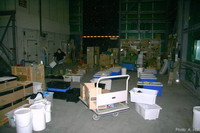Iraq to cut food ration program in 6 months
The number of people in Iraq receiving food rations will be cut by about 5 million by the end of June.

The ration system dates back to the first Gulf War, when the U.N. Security Council imposed economic sanctions on Iraq after the 1990 invasion of Kuwait. The ration system continued even after the fall of Saddam Hussein in 2003.
There have been calls to eliminate or limit the scope of the program since many Iraqis have become more prosperous. But Iraqi officials have resisted scraping the program altogether, fearing a public backlash.
Critics have stepped up pressure for changes during the a debate over the 2008 national budget.
The Finance Ministry now plans to eliminate well-off families from receiving rations. No income threshold has been set pending a survey by the Trade Ministry, which administers the program, the official said.
"We expect that about 5 million people will be excluded and this will give us more resources and freedom to help other people in need," the ministry official said, speaking on condition of anonymity because he wasn't authorized to release the information.
"In the second half of the year, rich families would be excluded from this system, so that poor families can get better and more food rations," he said.
Families of Cabinet ministers, legislators, businessmen, wealthy traders and better paid government employees would likely lose their rations, he said.
Trade Minister Abed Falah al-Sudani warned last week that two-thirds of the population of some 26 million rely on the rations amid fears the provisions would be cut due to a lack of budget funds.
Finance Minister Bayan Jabr said the program would remain unchanged for six months while the Trade Ministry completes the survey and prepares names of people who no longer need the rations, which include 10 basic foodstuffs for a nominal fee.
"The government has set a six-month period to achieve this project," Jabr told the state-run Al-Sabah newspaper in an interview published Monday. "This means that the ration food items will remain as they are for the next six months, but after this the ration food will be cut from the wealth families while the needy families will continue to receive them."
He did not provide more details. But the Finance Ministry official said an extra US$200 million was added to the original US$3 billion budget allocated for next year to offset any possible increase in foodstuff prices in international markets.
The system under which all Iraqis are issued ration cards allowing them to buy heavily subsidized sugar, flour, rice, powdered milk, cooking oil, tea, beans, baby milk, soap and detergent. The ration cards also have served as a means to track the population in the violence-wracked nation as Iraqis are forced to register for new versions when they move.
Subscribe to Pravda.Ru Telegram channel, Facebook, RSS!





